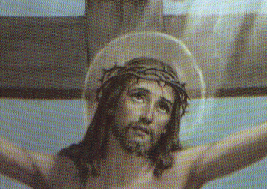
The Way of the cross
In Jesus' life there's a precise time in which it realizes a decisive choice for Jesus' conscience, about his final destiny. This happens during activity in the Galilee, when Jesus is opposed strongly by the hebrew religious authority. It's in these moments that Jesus begins "to think to the possibility of a violent death". A choice will be emphasized after thirty years, when sain Paul will be write the epistle to the hebrews: "He (Jesus)....submitted himself to the cross, despising the ignominy" (Heb. 12,2).
This sentence has been confirmed to the christians of Rome to. So Paul writes in the middle of 50 a. C.: "In fact Christ did not wish to do something for himself, but as it's written: the insults of those which insult you, have fallen above me" (Rom. 15,3).
In the Gospels there is an episode happened at Cesarea Philippi, in the north of Palestine. When Simon Peter tells to Jesus: "Your are the Christ, the Son of the living God", Jesus confirms: "Blessed are you, Simon Bar-Jona! For flesh and blood has not revealed this to you, but my Father who is in heaven....". And Jesus strictly charged the disciples to tell no one that he was the Christ.
For that time Jesus began to show his disciples that he must go to Jerusalem and suffer many things from the elders, and chief priest and scribes, and be killed, and on the third day be raised. And Peter took him and began to rebuke him, saying: "God forbid, Lord! This shall never happen to you". But he turned and saied to Peter: "Get behind me, Satan! You are a hindrance to me; for you are not on the side of God, but of men"(Mt 16,16-17.20-23).
Why this unexpected change of Jesus' feelings toward Peter? Because Peter doesn't grant the way of the cross chosen by Jesus.
Appearing to the disciples of Emmaus, Jesus remembers them: "Was it not necessary that the Christ should suffer these things and enter into his glory?" (Lk 24,26).
Then Jesus is fully conscious that the Project of God for the salvation of Humanity crosses his Passion and Death. Jesus lives this "divine choice" till to involve his own friends to it:
"Then Jesus told his disciples: "If any man would come after me, let him deny himself and take up his cross and follow me. For whoever would save his life will lose it, and whoever loses his life for my sake will find it" (Mt 16,24-25).
"And yet Jesus will begin to be greatly distressed and troubled in the hours of the Gethsemane, praying the Father in order that he remove the bitter chalice of the trouble (Cfr. Mark 14, 33-36)
But He abandons himself to the Father, till to sublime his consent to him, offering his life on the cross, till the last drop of blood. As he had said during his public life: "The Son of man came not to be served, but to serve, and to give his life as a ransom for many" (Mc 10,45).
For this, the real sense of Jesus' regality "is shown above the cross. Only after his resurrection, Jesus' Messianic regality will be able proclaimed by Peter to God's people: "All Israel must know God has constituted Lord and Christ that Jesus which you have crucified!" (Act. 2,36)(Catholic Church catechism, par. 440, pag. 124).
TO THE DISCOVERY OF JESUS OF NAZARETH